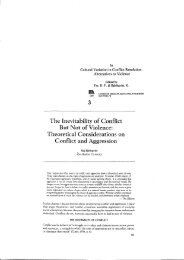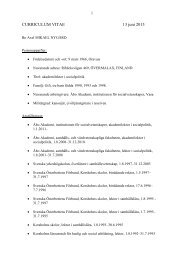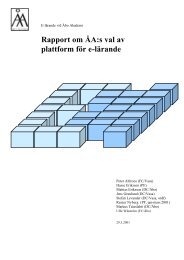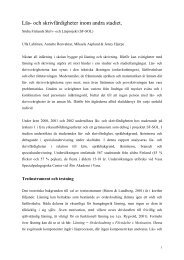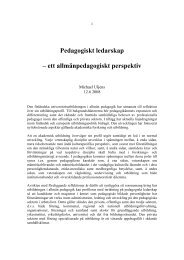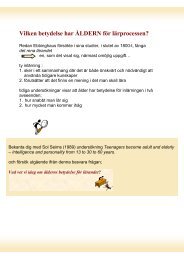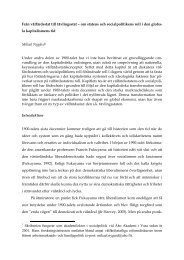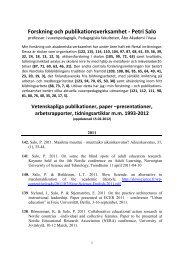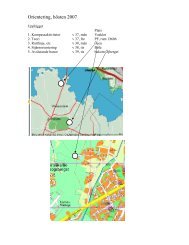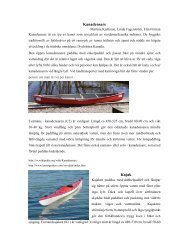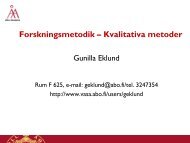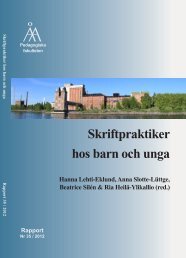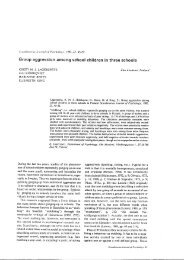Parties, Candidates and Citizens On-Line - Åbo Akademi
Parties, Candidates and Citizens On-Line - Åbo Akademi
Parties, Candidates and Citizens On-Line - Åbo Akademi
Create successful ePaper yourself
Turn your PDF publications into a flip-book with our unique Google optimized e-Paper software.
Tentatively, supporting the push perspective, the Finnish citizens might not be turning to<br />
the websites of the Finnish political parties <strong>and</strong> c<strong>and</strong>idates as these are generally quite<br />
lacklustre <strong>and</strong> mostly resemble traditional brochures. This is also partly supported by the<br />
higher interest shown by the citizens on visiting <strong>and</strong> placing emphasis in the innovative<br />
c<strong>and</strong>idate-selector websites. <strong>On</strong> the other h<strong>and</strong>, from the pull perspective, the political<br />
actors might not yet be making any extensive efforts with their websites as most citizens<br />
are not engaging in political activity on-line. Instead, they maintain a web presence mainly<br />
to stay up-to-date. The evidence presented in this thesis, nonetheless, indicate that on-line<br />
politics does not appear to affect the politics of Finl<strong>and</strong> in general.<br />
Regarding the future, however, this thesis did provide some evidence of the<br />
internet possibly becoming a ‘medium of choice’ in seeking political information for the<br />
next generation of Finnish voters. Even if this thesis demonstrated that these citizens<br />
were not becoming more engaged <strong>and</strong> active, this slight trend in the citizens dimension<br />
leaves open for some speculation concerning different potential directions for the future<br />
of the Finnish on-line political environment. First <strong>and</strong> foremost, a growing audience for<br />
internet politics could mean that the major actors further strengthen their positions. This<br />
would resemble environment B in the typology of on-line political environments. If the<br />
trend of young citizens placing emphasis on on-line information in making their voting<br />
decisions continues, the major actors would seem likely to catch the larger share of these<br />
voters. As Lusoli (2005b, 160) remarks: “The internet does attract a younger audience <strong>and</strong><br />
forces politicians to come to terms with the new medium”. As they can reach increasingly<br />
more citizens on-line, the resources of the major actors would be increasingly mobilized<br />
into their websites <strong>and</strong> their dominance among the on-line political actors would continue<br />
(cf. Gibson et al. 2003, 50-51; Margolis et al. 2003, 58). This potential development is<br />
arguably quite likely as the major political actors already dominate the Finnish on-line<br />
political environment even though they are not using the internet to its fullest potential.<br />
Secondly, tentatively, the smaller political actors who are disadvantaged through<br />
traditional mass media (Margolis et al. 2003, 58), could be more keen to seize the possible<br />
‘net gain’ <strong>and</strong> channel a large share of their resources towards catching the on-line voters<br />
(cf. Sadow & James 1999, 5). This could drive the on-line electoral competition towards a<br />
more equalized situation. If the smaller political actors are competing on a relative equal<br />
footing with the major actors for a growing on-line audience, <strong>and</strong> if they manage to<br />
attract these voters to their websites, on-line politics could influence off-line power<br />
structures as well (cf. Norris 2003, 43). This would correspond to situation D in the<br />
theoretical typology of online political environments. Finally, it is noteworthy that the<br />
impact of the internet could be due to political actors <strong>and</strong> activities not extensively<br />
analyzed in this thesis. The young are increasingly turning to new social movements,<br />
protest groups <strong>and</strong> transnational networks in their off-line political activity (Norris 2002).<br />
182



